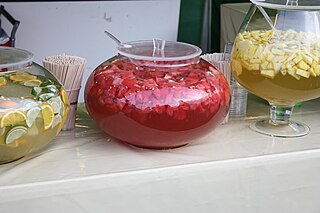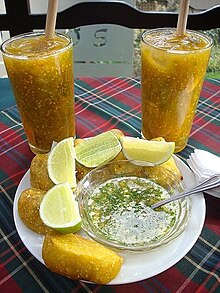
Squash is a non-alcoholic beverage with concentrated syrup used in beverage making. It is usually fruit-flavoured, made from fruit juice, water, and sugar or a sugar substitute. Modern squashes may also contain food colouring and additional flavouring. Some traditional squashes contain herbal extracts, most notably elderflower and ginger.

Passiflora edulis, commonly known as passion fruit, is a vine species of passion flower native to southern Brazil through Paraguay and northern Argentina. It is cultivated commercially in tropical and subtropical areas for its sweet, seedy fruit. The fruit is a pepo, a type of berry, round to oval, either yellow or dark purple at maturity, with a soft to firm, juicy interior filled with numerous seeds. The fruit is both eaten and juiced, the juice often added to other fruit juices to enhance aroma.

The term punch refers to a wide assortment of drinks, both non-alcoholic and alcoholic, generally containing fruits or fruit juice. The drink was introduced from the Indian subcontinent to England by employees of the East India Company in the late 17th century. Punch is usually served at parties in large, wide bowls, known as punch bowls.

Minute Maid is a product line of beverages, usually associated with lemonade or orange juice, but which now extends to soft drinks of different kinds, including Hi-C. Minute Maid is sold under the Cappy brand in Central Europe and under the brand "Моя Семья" in Russia and the Commonwealth of Independent States. Minute Maid was the first company to market frozen orange juice concentrate, allowing it to be distributed throughout the United States and served year-round. The Minute Maid Company is owned by The Coca-Cola Company, the world's largest marketer of fruit juices and drinks. The firm opened its headquarters in Sugar Land Town Square in Sugar Land, Texas, United States, on February 16, 2009; previously it was headquartered in the 2000 St. James Place building in Houston.

Aguardiente (Spanish), or aguardente (Portuguese), is a generic term for alcoholic beverages that contain between 29% and 60% alcohol by volume (ABV). It originates in the Iberian Peninsula and in Iberian America.

Hawaiian Punch is a brand of fruit punch currently manufactured by Keurig Dr Pepper, originally invented in 1934 by A.W. Leo, Tom Yeats, and Ralph Harrison as a topping for ice cream. It was started from an original syrup flavor called Leo's Hawaiian Punch, containing orange, pineapple, passion fruit, guava and papaya, and is currently offering 14 different flavors since 2020. The drink is currently made with 3% fruit juice.

Solanum quitoense, known as naranjilla in Ecuador, Costa Rica, and Panama and as lulo in Colombia, is a tropical perennial plant from northwestern South America. The specific name for this species of nightshade means "from Quito."

Colombian cuisine is a compound of the culinary traditions of the six main regions within Colombia. Colombian cuisine varies regionally and is particularly influenced by Indigenous Colombian, Spanish, and African cuisines, with slight Arab influence in some regions. Furthermore, being one of the most biodiverse countries in the world, Colombia has one of the widest variety of available ingredients depending on the region.
Postobón, S.A. is the largest Colombian beverage company, and also one of the largest in South America. The company has a wide portfolio of products that includes soft drinks, fruit juices, bottled water, tea, an energy drink, and coffee.

Champús is a drink popular in Peru, Ecuador and southwest Colombia, made with maize, fruits such as lulo, pineapple, quince or guanábana, sweetened with panela and seasoned with cinnamon, cloves and orange tree leaves.

Aguapanela, agua de panela or agüepanela is a drink commonly found throughout South America and a few parts of Central America and Caribbean. Its literal translation means "panela water" as it is an infusion made from panela which is derived from hardened sugar cane juice.

Licuados are a Latin American handmade blended beverage similar to smoothies, made with milk, fruit, and usually ice. They are also sometimes called "preparados".

Juice is a drink made from the extraction or pressing of the natural liquid contained in fruit and vegetables. It can also refer to liquids that are flavored with concentrate or other biological food sources, such as meat or seafood, such as clam juice. Juice is commonly consumed as a beverage or used as an ingredient or flavoring in foods or other beverages, as for smoothies. Juice emerged as a popular beverage choice after the development of pasteurization methods enabled its preservation without using fermentation. The largest fruit juice consumers are New Zealand and Colombia. Fruit juice consumption on average increases with a country's income level.

Solanum pseudolulo is a subtropical perennial plant from northwestern South America. The pseudolulo is a large herbaceous plant or a small shrub, with heart-shaped leaves. The leaves and stems of the plant are covered in short hairs, and the entire plant is often covered in sharp spines.

Samalamig, also known as palamig, refers to various traditional Filipino sweet chilled beverages that usually include jelly-like ingredients. They can come in various flavors. They are commonly sold by street vendors as refreshments. Typical ingredients of the drinks include gulaman (agar), sago pearls, kaong, tapioca pearls, nata de coco, and coconut. They are usually anglicized as pearl coolers or pearl and jelly coolers.
Vascular wilt in the perennial shrub lulo or naranjilla is a disease caused by the fungus Fusarium oxysporum f. sp. quitoense.














